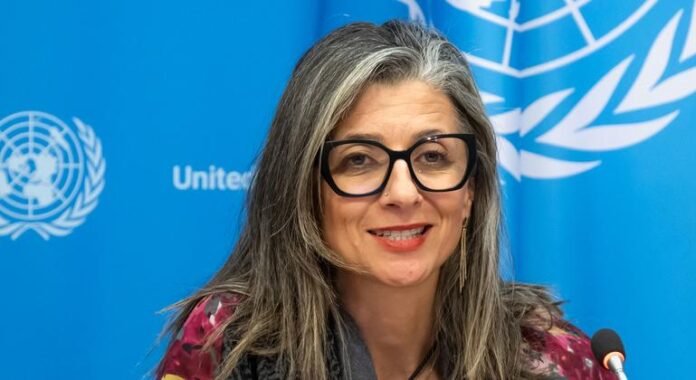
They’re calling for the decision to be reversed, warning it could undermine the wider international human rights system.
The sanctions were announced by US Secretary of State Marco Rubio on Wednesday under a Presidential Executive Order.
Mr. Rubio alleged that Ms. Albanese had “directly engaged with the International Criminal Court (ICC) in efforts to investigate, arrest, detain, or prosecute nationals of the United States or Israel, without the consent of those two countries,” which he called a “gross infringement” on national sovereignty.
The US and Israel are not parties to the Rome Statute, the international treaty that established the ICC.
Dangerous precedent and unacceptable
Reacting to the announcement, UN Spokesperson Stéphane Dujarric said that the imposition of sanctions on Special Rapporteurs sets a “dangerous precedent.”
“The use of unilateral sanctions against Special Rapporteurs or any other UN expert or official is unacceptable,” he said on Thursday at his regular news briefing in New York.
He also highlighted the independent mandate and role of the Special Rapporteurs, noting that Member States “are perfectly entitled to their views and to disagree with” the experts’ reports.
“But we encourage them to engage with the UN’s human rights architecture,” he added.
Call for reversal
In a statement issued on Thursday, UN High Commissioner for Human Rights Volker Türk called for the “prompt reversal” of the sanctions against the Human Rights Council-appointed Special Rapporteur “in response to work she has undertaken under the mandate” she is tasked with.
“Even in face of fierce disagreement, UN Member States should engage substantively and constructively, rather than resort to punitive measures,” he said.
The UN rights chief also called for an end to attacks and threats against mandate holders appointed by the council, as well as key institutions like the ICC.
“The solution is not less, but more, debate and dialogue on the very real human rights concerns they address,” Mr. Türk urged.
Cooperation, not reprisal
Jürg Lauber, President of the UN Human Rights Council, also voiced regret over the punitive move by the US.
In a statement, he highlighted that Special Rapporteurs “are an essential instrument” in fulfilling the Council’s mandate and urged all nations to “fully cooperate” with them.
“I call on all UN Member States…to refrain from any acts of intimidation or reprisal against them,” he said.
Independent Special Rapporteurs
Special Rapporteurs are appointed under what is known as the Special Procedures of the Human Rights Council.
They are independent experts appointed to monitor and report on human rights issues worldwide. These experts serve in their personal capacity, are not UN staff and receive no financial remuneration for their work.
They regularly report to the Geneva-based council as well as to the UN General Assembly in New York.
In addition to the mandate on the occupied Palestinian territory, mandates exist to monitor human rights in countries such as Iran, the Democratic People’s Republic of Korea and Afghanistan. In all there are 46 thematic and 14 different country-based mandates.





